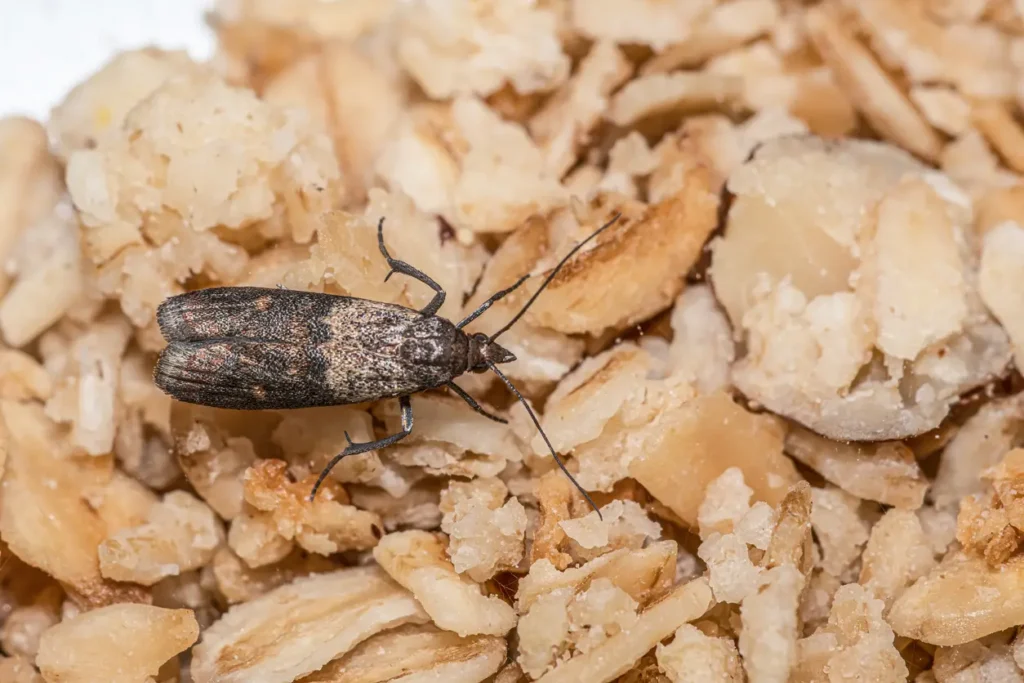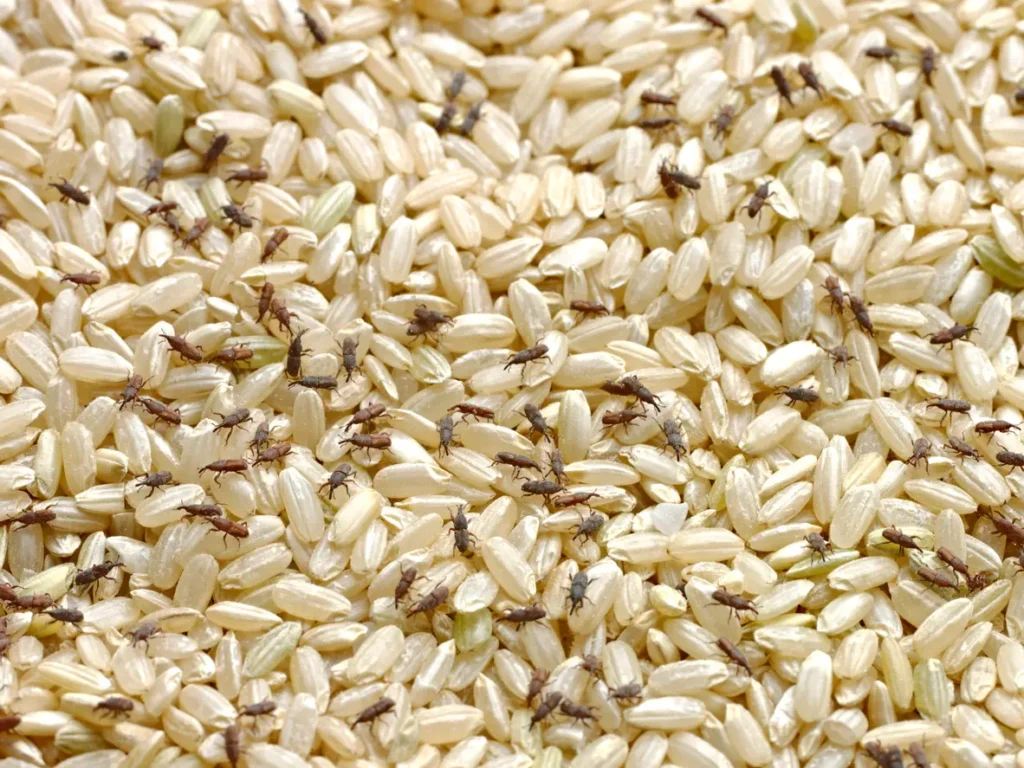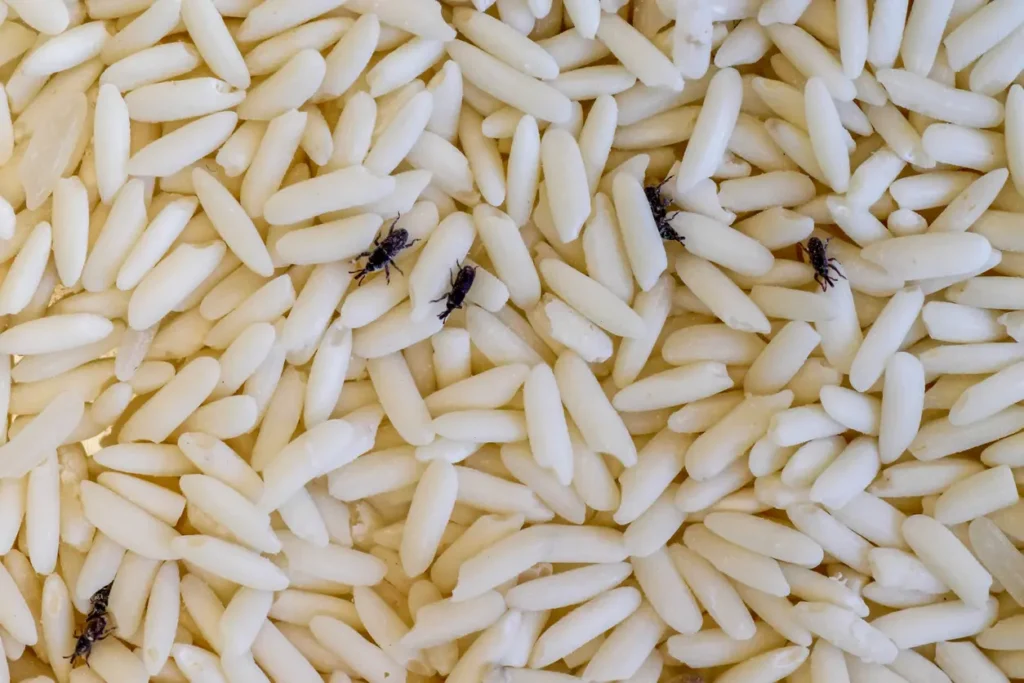
Pantry Pest Control in St. Johns County, FL
Encountering pests in your pantry can be a frustrating and unwelcome surprise, particularly when they invade your dry goods like flour, rice, and cereals. In St. Johns County, FL, the warm and humid climate creates the ideal environment for pantry pests like moths, beetles, and weevils. These pests can spoil your food quickly, leading to waste and inconvenience. If you spot pantry pests in your kitchen, it’s essential to take immediate action to prevent a larger infestation from taking hold.
At All U Need Pest Control, we specialize in eliminating pantry pests and providing long-term prevention solutions for homes in St. Johns County. Our services include comprehensive inspections, effective treatments, and strategies to help you keep your pantry pest-free. If you suspect a pantry pest problem or would like a free inspection, call us at 1-888-239-BUGS (1-888-239-2847). We’re ready to safeguard your home and ensure your food stays safe from these unwanted intruders.
Read on to learn more about how pantry pests can invade your home and what you can do to keep them out.
Pest Control Services in St. Johns County, FL

How To Get Rid of Pantry Pests in St. Johns County, FL
If you discover pantry pests in your food, your first instinct may be to throw away the infested items. However, pests like weevils, beetles, and moths often spread rapidly, laying eggs or larvae in nearby food products. Discarding just the affected items may not be enough to eliminate the problem, as pests may still be hiding in other parts of your pantry.
To fully eliminate pantry pests, you should carefully inspect all of your stored food. Look for signs like small holes in packaging, live insects, larvae, or eggs. Even if some items seem untouched, it’s often safer to discard them to avoid further contamination. While pantry pests don’t typically pose a health risk, they can make your food unsafe to eat.
If you find multiple items are infested, it’s crucial to act quickly. DIY solutions may offer short-term relief, but they rarely resolve the full problem. Professional pest control services offer a more comprehensive and long-lasting solution. At All U Need Pest Control, we use targeted treatments to eliminate pantry pests and ensure they don’t return, giving you long-term peace of mind.

Pantry Pest Treatment in St. Johns County, FL
At All U Need Pest Control, we utilize an Integrated Pest Management (IPM) approach to handle pantry pest infestations in homes throughout St. Johns County. This method not only eliminates the pests currently in your home but also focuses on preventing future infestations, ensuring that your pantry remains pest-free.
The first step in our process is a thorough inspection. Once you contact us, our expert technicians will assess the extent of the infestation and identify the specific pests involved. We’ll also check for potential entry points and examine your food storage practices, offering guidance on how to prevent future infestations. Once the inspection is complete, we’ll create a tailored treatment plan designed to address your home’s specific needs.
The second step involves an interior flush-out. During this phase, we apply safe and effective chemical treatments and pheromone traps to target the pests in your pantry. These treatments are carefully designed to eliminate the pests while ensuring the safety of your family and pets. By focusing on high-activity areas, we ensure that the infestation is fully addressed.
The final step is an exterior flush, where we seal any cracks, gaps, or other potential entry points around your home to prevent pests from returning. We’ll also schedule follow-up visits to monitor the situation and ensure your pantry stays pest-free.

Signs of a Pantry Pest Infestation in St. Johns County, FL
Pantry pests can be hard to detect early on, but there are several signs that may indicate an infestation. Identifying these signs early on can help you take action before the problem worsens, preventing further food loss and contamination.
One of the most apparent signs of a pantry pest infestation is seeing live insects, larvae, or eggs in your stored food. Pantry pests often target dry goods like flour, rice, cereals, grains, and pasta. You may notice pests crawling inside packaging or even on pantry shelves. If moths are involved, you might also spot them flying around your home, even in rooms far from the kitchen. Although adult moths don’t eat food, their larvae do, so seeing moths could mean that a larger infestation is present in your pantry.
Another common indicator is webbing, particularly from moth larvae. These fine silk webs may appear on food surfaces, inside packages, or in the corners of your pantry. Webbing is a strong sign that larvae are feeding on your stored food.
You may also find small droppings near food containers. These droppings resemble tiny pellets and indicate that pests have been feeding on your food. Damaged packaging, such as holes or chew marks, is another sign that pantry pests have infiltrated your home.
How To Check for Pantry Pests
If you suspect pantry pests in your home, it’s important to thoroughly inspect all your stored food. Pantry pests are attracted to a variety of dry goods, including grains, cereals, flour, dried fruits, nuts, spices, and even pet food. Start by examining the packaging for visible signs of insects, larvae, or eggs. You can empty suspicious items onto a baking sheet or tray to sift through and check for pests.
For finer food items like flour or powdered sugar, using a sifter can help catch pests that may be hiding in the food. If you find pests in multiple items, it’s best to discard them and contact a professional pest control service to ensure the infestation doesn’t spread further.

What Kinds of Pantry Pests Are There?
There are many types of pests that can invade your pantry, each with unique characteristics and challenges. From beetles feeding on grains to moths infesting dried fruits and cereals, pantry pests can destroy large amounts of food if left untreated. Below are some of the most common pantry pests found in homes throughout St. Johns County, FL.
Indian Meal Moths
Indian meal moths are one of the most common pantry pests in St. Johns County. These moths have a wingspan of about 5/8 of an inch and are easy to recognize by their two-toned wings. The front part of their wings is pale gray or tan, while the back is reddish-brown or bronze. Female moths lay eggs directly on food products, and once the eggs hatch, the larvae begin feeding on your stored food.
The larvae are cream-colored with brown heads and can grow up to half an inch in length. While adult moths don’t eat food, their larvae can cause significant damage by feeding on grains, flour, cereals, and other dry goods. Once the larvae mature into moths, they may fly around your home, making it seem like the infestation is gone, but larvae may still be present.
Merchant Grain Beetles
Merchant grain beetles are another common pantry pest in St. Johns County. These small beetles, about 1/10th of an inch long, have flat, narrow bodies that allow them to slip through small cracks in food packaging. Their dark brown color and ability to fly help them spread quickly throughout your pantry.
Merchant grain beetles typically infest dry goods such as rice, oats, flour, and cake mixes. They feed on these products and lay eggs inside the packaging, leading to contamination and food spoilage if not addressed promptly.
Flour Beetles
Flour beetles are notorious for invading dry food items like pasta, cereals, and crackers. While these beetles don’t bite, they can chew through packaging, contaminating the food inside and causing significant waste if left untreated.
There are two common species of flour beetles: red flour beetles and confused flour beetles. Red flour beetles are reddish-brown with three-segmented antennae, while confused flour beetles look similar but have four-segmented antennae. Both species require professional pest control to fully eliminate the infestation.
Weevils
Weevils are another frequent pantry pest in St. Johns County. These small beetles typically infest grains, rice, and other dry goods. Rice weevils are about 1/10th of an inch long and have reddish-brown or black bodies with four light-colored spots on their wings. Granary weevils, which are slightly larger, lack these light spots.
Weevils use their long snouts to bore through food packaging, contaminating the contents inside. If left untreated, weevils can quickly spread and ruin large amounts of stored food.

How To Prevent Pantry Pests in St. Johns County, FL
Preventing pantry pests requires a combination of proper food storage, cleanliness, and regular inspections. The best way to keep pantry pests out is by storing your food in airtight containers. Using glass or durable plastic containers with tight-fitting lids will help keep pests out while preserving the freshness of your food.
Before purchasing food, inspect the packaging for signs of damage, such as holes or tears, which could indicate that pests have already gained access. Avoid mixing new food with older items until you’ve thoroughly checked for signs of pests. You can also freeze dry goods like flour, grains, and nuts for a few days after buying them to kill any pests or eggs that may be present.
Keeping your pantry clean is another key step in preventing pests. Regularly wipe down your shelves and clean up any spills or crumbs immediately. Discard expired or unused food to reduce the chances of attracting pests. Conducting a deep clean of your pantry every few months will help keep pests at bay.
Finally, inspect your home for cracks or gaps around windows, doors, or pipes, and seal these openings to prevent pests from entering your pantry.
Eco-Friendly Solutions
At All U Need Pest Control, we prioritize eco-friendly pest control methods that are safe for your family and pets. Our treatments are registered with the Environmental Protection Agency (EPA) and are designed to effectively target pantry pests while minimizing harm to the environment. We use safe, non-toxic products to eliminate pests without putting your household at risk.
We also recommend natural repellents, such as bay leaves and essential oils, to help keep pests out of your pantry. Our team can provide advice on maintaining a pest-free pantry using eco-friendly, non-toxic solutions.

Eliminate Your Pantry Pest Problem in St. Johns County, FL
Pantry pests can be a serious nuisance, but you don’t have to let them take over your home. If you notice insects in your food or suspect a pantry pest infestation, it’s important to act quickly to prevent the problem from worsening. Ignoring the issue can lead to a larger infestation and more wasted food.
At All U Need Pest Control, we provide effective pantry pest removal and long-term prevention strategies to ensure pests don’t return. Our team will visit your home within 48 hours to assess the situation and begin treatment. We also offer flexible scheduling, including evenings and weekends, to meet your needs.
If you’re ready to eliminate pantry pests from your home or want to schedule a free inspection, contact All U Need Pest Control today at 1-888-239-BUGS or use our online contact form to make an appointment.
Location Contact:
114 Allgood Circle Unit 109 St. Augustine, FL 32086
Get Directions for 114 Allgood Circle Unit 109St. Augustine, FL 32086 on Google Maps904-712-1989
Call All "U" Need Pest Control